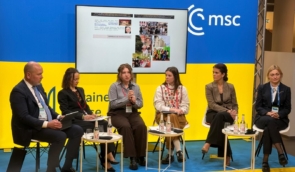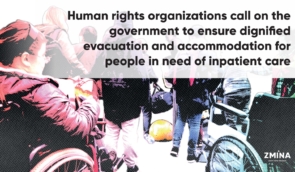The occupation is characterized by systemic repression to undermine rights and enforce control – Tetiana Zhukova
Le Courrier d’Afrique 54: Hello, can you tell us about your professional background ?
Tetiana Zhukova: Hello, thank you for the opportunity. I am Tetiana Zhukova, International Advocacy Manager at the Human Rights Centre ZMINA, a Ukrainian non-governmental organization, founded in 2012. ZMINA is a member of the Ukraine 5 AM Coalition, which gathers civil society’s efforts in documenting international crimes. In particular, my organization works on documentation of torture, enforced disappearances, deportation and persecution. My focus is primarily on raising awareness about documented violations and advocating for accountability and liberation of thousands of civilian detainees held in Russian captivity. As International Advocacy Manager at ZMINA, I coordinate our efforts with international partners, engage with institutions such as the UN, EU and OSCE, and ensure that the voices of victims of human rights abuses, particularly from occupied territories like Crimea, are heard on the global stage.
Le Courrier d’Afrique 54: You recently participated in the Helsinki +50 conference, held in Helsinki, the Finnish capital, on July 31st. What were the highlights of this conference?
Tetiana Zhukova: The Helsinki+50 Conference marked the 50th anniversary of the Helsinki Final Act, which laid the foundation for East-West dialogue during the Cold War and remains central to the OSCE’s approach to security, emphasizing respect for sovereignty, human rights, and cooperation. The conference was attended by the President of Finland, the UN High Commissioner for Human Rights, the OSCE Secretary-General and other high officials, diplomats and civil society from the regions of Europe, North America, and Central Asia. We could hear in their speeches joy on the occasion of the 50th anniversary of the Act mixed with the urge for reforms, caused by unresolved challenges in the region. We used this platform to remind about one of such challenges: Russia’s invasion of Ukraine, which started in 2014 from the Crimean Peninsula and remained widely unanswered, which led to wider aggression.
Le Courrier d’Afrique 54: What are the main focuses of the OSCE against the Russian invasion of Ukraine?
Tetiana Zhukova: The OSCE has taken several steps, although its capacity has been challenged by Russia’s obstruction. They launched the mechanism to document international crimes, including the deportation of thousands of Ukrainian children to Russia, illegal detention of Ukrainian civilians in occupied territories, and torture of Ukrainian prisoners of war. The OSCE Parliamentary Assembly and diplomats from various countries passed resolutions and statements condemning the invasion and calling for support to Ukraine. Finally, the OSCE Special Monitoring Mission, which operated in Ukraine until Russia forced its closure, played a crucial role in documenting events on the ground. However, in 2022, Russians detained three OSCE officials working in this mission, Dmytro Shabanov, Maksym Petrov and Vadym Golda, and sentenced them to 13-14 years of detention for the mere fact of documenting the truth. They are still in Russian prisons, and the OSCE is unable to liberate its own officials, so there is a strong need to reform OSCE structures to prevent future paralysis and improve their response to such situations.
Le Courrier d’Afrique 54: What is the human rights situation in Sevastopol today?
Tetiana Zhukova: Sevastopol, as in other parts of occupied Crimea, remains under severe restrictions, with fundamental freedoms curtailed and civilians living under constant threat. The occupation is characterized by systemic repression, including arbitrary detentions, forced assimilation, indoctrination, hate speech – methods used to undermine rights and enforce control. Among the most common violations are politically motivated persecution for pro-Ukrainian position, journalistic activity or activism, as well as on religious and ethnic grounds. We know about over 220 political prisoners from Crimea, ranging in age from as young as 19 to as old as 75. Most of them are Crimean Tatars, who are predominantly Muslim. Russian occupying authorities raid private homes, workplaces and mosques under the pretext of searching for “extremist” materials and other fabricated evidence. Trials are a sham, and the punishments severe, frequently resulting in 15 to 20-year sentences in penal colonies. The majority of political prisoners are deported to penitentiary institutions in the Russian Federation, thousands of kilometers from their homes. Despite these severe conditions, a peaceful resistance persists in occupied Crimea, as courageous individuals continue to stand firm in defense of their rights, identity, and hope for freedom.
Le Courrier d’Afrique 54: Crimea: 11 Years of Occupation – Restoring Justice, Reinforcing OSCE Commitments is the theme of your talk. Why did you choose this slogan?
Tetiana Zhukova: This theme highlights two imperatives. First, restoring justice is essential – after more than a decade of occupation, we must demand accountability and ensure that all human rights violations and breaches of international law are properly addressed. Second, it is about reinforcing the commitments of the OSCE. The organization needs to demonstrate its support for the principles outlined in the Helsinki Final Act. By strengthening its institutions and taking concrete steps about Crimea, the OSCE will reaffirm its relevance and dedication to upholding a rules-based international order.
Source: Le Courrier d’Afrique 54, in French, in English
If you have found a spelling error, please, notify us by selecting that text and pressing Ctrl+Enter.















